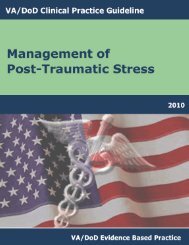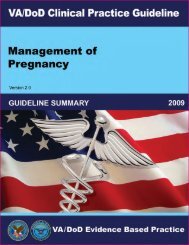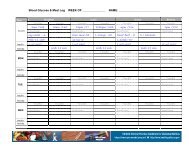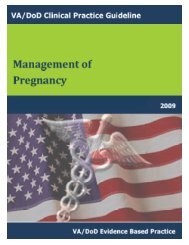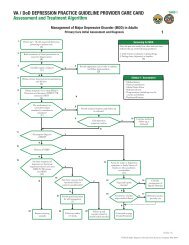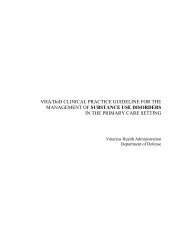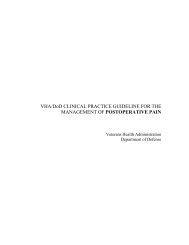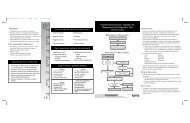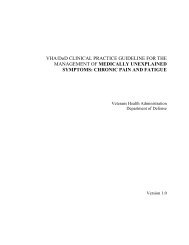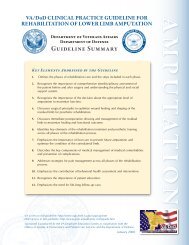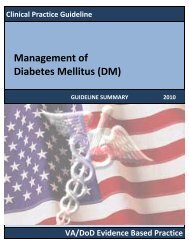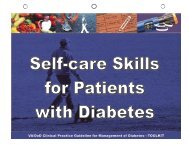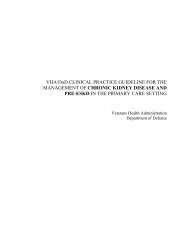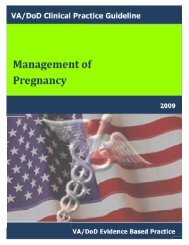DM Full Guideline (2010) - VA/DoD Clinical Practice Guidelines Home
DM Full Guideline (2010) - VA/DoD Clinical Practice Guidelines Home
DM Full Guideline (2010) - VA/DoD Clinical Practice Guidelines Home
Create successful ePaper yourself
Turn your PDF publications into a flip-book with our unique Google optimized e-Paper software.
Version 4.0<br />
<strong>VA</strong>/<strong>DoD</strong> <strong>Clinical</strong> <strong>Practice</strong> <strong>Guideline</strong><br />
for the Management of Diabetes Mellitus<br />
includes both effective interventions (collaborative sessions that are repeated) and ineffective interventions (single<br />
didactic sessions). A referral for in-depth DSME and diet consultation (if separate from the diabetes selfmanagement<br />
program) is recommended for all patients diagnosed with <strong>DM</strong>.<br />
Norris et al. (2002a) reviewed 31 randomized controlled trials (RCTs) that measured the impact of self-management<br />
education on adults with type 2 diabetes on HbA 1 c. Self-management education improved HbA 1 c levels at<br />
immediate follow-up and increased contact time enhanced the effect. The benefit declined 1 to 3 months after the<br />
intervention, however, suggesting that learned behaviors change over time, or that continued follow-up and<br />
reinforcement is needed.<br />
Davies et al., (2008) reported the results of a multicenter cluster randomized trial involving 824 adults with newly<br />
diagnosed type 2 diabetes (55% men, mean age 59.5 years) in 207 general practices in 13 primary care sites in the<br />
United Kingdom. The intervention was a six hour, community based, structured group education program provided<br />
by two trained healthcare educators and compared to usual care. The intervention resulted in greater improvements<br />
in weight loss and smoking cessation and positive improvements in beliefs about illness but no difference in HbA 1 c<br />
levels up to 12 months after diagnosis.<br />
There is some evidence-based work on the effectiveness of MNT. In a 6-month RCT evaluating the impact of MNT<br />
on glycemic control, Franz et al. (1995) reported that 94 patients who received 3 ongoing MNT visits from<br />
registered dietitians (RD) had a mean 10.5 point lower fasting plasma glucose (FPG) level compared to a 5.3<br />
decrease in 85 patients who had a single visit with an RD and no improvement in 62 patients who did not receive<br />
any MNT from an RD. Education may also be given in different modes. See Annotation J.<br />
EVIDENCE<br />
Recommendation Sources LE QE SR<br />
1 Provision of comprehensive<br />
DSME and MNT education.<br />
2 Setting behavioral goals and<br />
determining a follow-up<br />
schedule with patient.<br />
3 Assessment of patient’s<br />
knowledge of <strong>DM</strong> and<br />
understanding about self-care.<br />
4 Provision of specialized referrals<br />
when necessary.<br />
5 Education provided in either<br />
individual or group settings.<br />
Davies et al., 2008<br />
Ellis et al., 2004<br />
Funnell et al., 2009<br />
Colagiuri et al., 2009<br />
Corabian & Harstall, 2001<br />
Miller et al., 2002<br />
Norris et al., 2001, 2002a<br />
Rickheim et al., 2002<br />
Garcia and Suarez, 1996<br />
Glasgow et al., 1992<br />
Pascale et al., 1995<br />
DCCT, 1997<br />
UKPDS 24, 1998<br />
Aubert et al., 1998<br />
Franz et al., 1995<br />
Norris et al., 2002b<br />
Sikka et al., 1999<br />
Rickheim et al., 2002<br />
Scain et al., 2009<br />
Duke et al., 2009<br />
Raji et al., 2002<br />
I<br />
I<br />
III<br />
II-2<br />
II-2<br />
II-2<br />
III<br />
I<br />
II-3<br />
I<br />
I<br />
Good<br />
Good<br />
Good<br />
Good<br />
Fair<br />
Fair<br />
Poor<br />
Fair<br />
Fair<br />
Good<br />
Good<br />
A<br />
B<br />
B<br />
B<br />
B<br />
I Good A<br />
II-1<br />
II-2<br />
I<br />
II-2<br />
I<br />
I<br />
I<br />
I<br />
LE-Level of Evidence; QE = Quality of Evidence; SR = Strength of Recommendation (see Appendix A)<br />
Fair<br />
Fair<br />
Good<br />
Fair<br />
Fair<br />
Fair<br />
Fair<br />
Good<br />
B<br />
B<br />
B<br />
B<br />
B<br />
B<br />
Module M: Self-management Page 110



